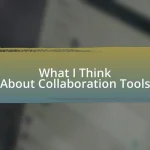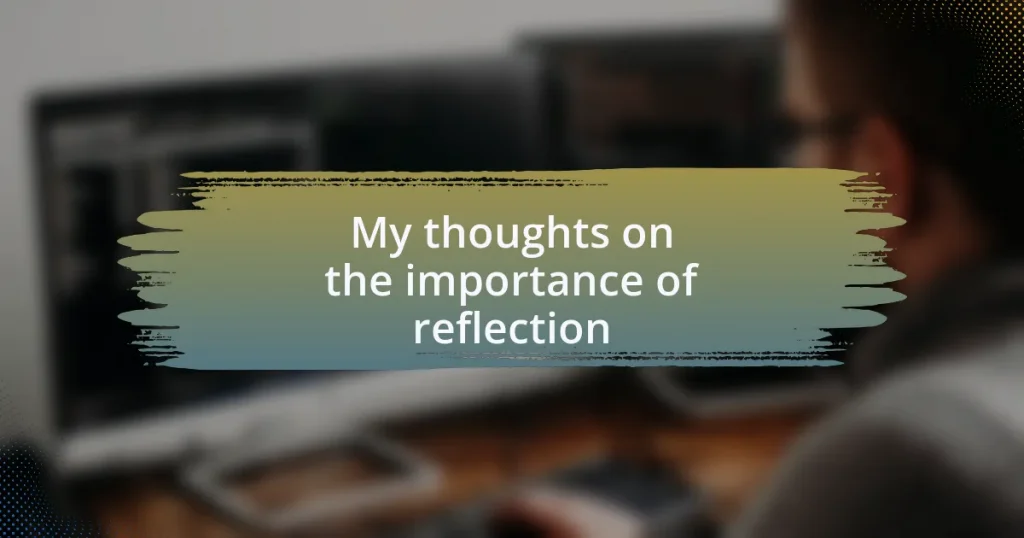Key takeaways:
- Reflection in web development allows developers to inspect and modify code behaviors dynamically, enhancing problem-solving skills and efficiency.
- Journaling, pair programming, and regular retrospectives are effective techniques to facilitate meaningful reflection and improve coding practices.
- Creating a dedicated space for reflection and incorporating it into team routines fosters collective growth and deeper understanding among team members.
Author: Charlotte Everly
Bio: Charlotte Everly is an accomplished author known for her evocative storytelling and richly drawn characters. With a background in literature and creative writing, she weaves tales that explore the complexities of human relationships and the beauty of everyday life. Charlotte’s debut novel was met with critical acclaim, earning her a dedicated readership and multiple awards. When she isn’t penning her next bestseller, she enjoys hiking in the mountains and sipping coffee at her local café. She resides in Seattle with her two rescue dogs, Bella and Max.
Understanding reflection in web development
Reflection in web development is a powerful tool that allows developers to inspect and modify program behavior dynamically. Have you ever found yourself debugging a complex piece of code and wished you could look inside its workings more easily? I certainly have. Learning to leverage reflection can streamline the troubleshooting process, making it less of a headache and more of a productive inquiry.
As I’ve delved into reflection in various programming languages, I’ve often been struck by its dual nature. On one hand, it offers tremendous flexibility, allowing for advanced techniques such as dependency injection or automated testing. On the other hand, this power must be wielded carefully; improper use can lead to performance issues or harder-to-maintain code. Doesn’t that challenge sound familiar in our fast-paced development environment?
When I first experimented with reflection, I felt a mix of excitement and trepidation. The ability to glean insights about classes and methods at runtime felt almost magical. However, I quickly realized that while it opens doors to creative solutions, it also requires a deep understanding of the underlying principles. This balance of creativity and rigor is what truly enriches my journey as a web developer. How do you navigate these complexities in your own projects?
Benefits of reflection for developers
Reflection offers developers an invaluable chance for self-improvement. In my early days as a web developer, I often rushed through projects, focusing solely on delivering functionality. However, taking the time to pause and reflect on my work allowed me to identify patterns in my coding practices, ultimately leading to better efficiency and fewer bugs in future iterations. Hasn’t a moment of reflection ever led you to a breakthrough in your own work?
Another benefit I’ve experienced is the enhancement of problem-solving skills. When I faced a particularly challenging piece of code, stepping back and analyzing my past approach provided insights into new strategies. It’s fascinating how revisiting previous solutions can spark innovative ideas, isn’t it? This ongoing dialogue with myself has not only improved my code quality but also boosted my confidence as I tackle more complex challenges.
Moreover, reflection encourages a culture of learning within development teams. I remember a project debrief where each team member shared their lessons learned. This open exchange fostered camaraderie and resulted in collective growth. Those discussions illuminated my understanding of different perspectives, refreshing my approach to our projects. How has reflection shaped the dynamics in your teams?
Techniques for effective reflection
When it comes to effective reflection, one technique I’ve found particularly helpful is journaling about my coding experiences. After completing a project, I jot down what went well and what could have been improved. I often discover that this simple practice not only clarifies my thoughts but also creates a documented history of my progression as a developer. Have you ever tried keeping a developer’s journal?
Another approach that has transformed my reflection process is pair programming. Collaborating with another developer gives me the opportunity to articulate my thought process while coding. Often, as I verbalize my logic, I uncover shortcomings in my approach or find new perspectives offered by my partner. Isn’t it fascinating how a conversation can uncover insights that solitary work may overlook?
Lastly, I’ve experienced significant growth from holding regular retrospectives, not just in teams but even in my personal projects. Taking time to review successful and challenging moments helps me to pinpoint specific learnings. This structured reflection fosters a proactive mindset, making it easier to address potential pitfalls before they arise. What about you? How do you gather insights from your experiences?
Personal experiences with reflection
The moments of reflection that resonate with me the most often come after a particularly challenging project. I vividly remember a time when I struggled with responsive design. Once I took a step back to analyze my work, I realized that my initial assumptions about browser behavior had led me astray. Have you ever found clarity in the sudden realization that adjusting small details can yield significant improvements?
I also cherish the quiet moments I spend reflecting on my work in a comfortable setting, like my favorite coffee shop. It’s during these instances that I allow my mind to wander through the successes and failures of a recent project. I can’t help but feel a mix of pride and frustration as I write down what I’ve learned. Does anyone else find that physical ambiance can enhance the depth of their reflection?
Lastly, I’ve found that sharing my reflections with my fellow developers brings a wave of new insights. I once held an informal discussion group where we each shared our reflections from the previous month. Hearing different perspectives not only deepened my understanding but also inspired me to tackle my coding challenges with renewed enthusiasm. Isn’t it incredible how connecting with others can amplify our learning experiences?
Tools for enhancing reflection
Tools can profoundly enhance our reflection process, and I’ve found a few that truly stand out. For instance, I often turn to journaling apps, which help me capture fleeting thoughts and insights immediately. It’s remarkable how revisiting these notes later reveals patterns that I might not have noticed at the time—has anyone else experienced that light bulb moment when reading past entries?
Another tool I swear by is the use of mind mapping software. I remember a project where I felt overwhelmed by the complexity of my ideas, but mind mapping allowed me to visually organize them. Seeing my thoughts laid out clearly made it easier to confront challenges head-on. Don’t you think a visual representation of your thoughts can simplify problem-solving?
Lastly, collaborative platforms can be game-changers for reflection. I utilize platforms like Google Docs, where I can not only jot down my musings but also invite teammates to contribute their insights. This dynamic exchange often sparks deeper discussions and offers perspectives I hadn’t considered before. Have you ever been surprised by how much richer your understanding becomes when others join the conversation?
Building a reflection practice
Developing a consistent reflection practice is like nurturing a garden; it takes time and attention to flourish. Personally, I started setting aside just ten minutes each day to quietly assess my thoughts about recent projects. Initially, it felt awkward, almost like I was trying to squeeze out a few drops of creativity. Yet, that small commitment gradually opened up a floodgate of understanding about my decision-making process. Have you ever carved out quiet times for yourself and found hidden insights?
I also encourage creating a dedicated space for reflection, both physically and mentally. For me, it meant finding a cozy corner in my home with minimal distractions. I recall a winter evening when I curled up there with a warm cup of tea, allowing my mind to wander back through past successes and failures. That space became sacred—like the perfect canvas for painting my thoughts. Can you think of a spot where you feel most inspired?
Incorporating reflection into team routines can amplify its benefits exponentially. I remember a weekly meeting where we dedicated the first ten minutes to sharing insights from our individual reflections since our last gathering. This practice not only fostered openness among team members but also generated a collective wisdom that I find hard to come by in solitary reflection. Doesn’t it feel enriching to blend your insights with others and discover new dimensions to your thoughts?















